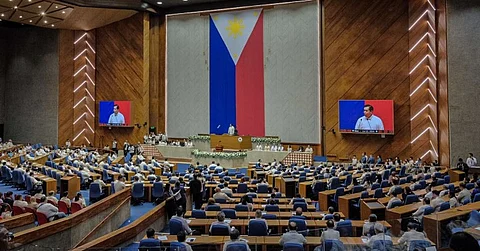
- NEWS
- the EDIT
- COMMENTARY
- BUSINESS
- LIFE
- SHOW
- ACTION
- GLOBAL GOALS
- SNAPS
- DYARYO TIRADA
- MORE

WHEN the 19th Congress opened its first session, the country stood at a crossroads. The nation was still emerging from the long shadow of the pandemic, economic recovery was fragile, and the public’s trust in institutions remained uncertain. The House of Representatives had a choice: remain business as usual or rise to the moment with purpose, focus, and unity.
Under the leadership of Speaker Ferdinand Martin G. Romualdez, the House chose the harder but more meaningful path.
From the outset, Speaker Romualdez envisioned a House not merely of politicians, but of public servants—a legislative chamber that listened to the people, learned from their struggles, and legislated with their needs in mind. He reoriented the institution toward performance, professionalism, and proximity to the Filipino public. And he anchored its mission on two national foundations: President Ferdinand Marcos Jr.’s Bagong Pilipinas governance agenda, and the Philippine Development Plan 2023–2028.
This alignment was neither ceremonial nor rhetorical—it was practical, strategic, and ultimately, effective.
Throughout its term, the 19th Congress translated national vision into enforceable, actionable law. By the end of its run, it had passed 32 out of 64 measures under the Common Legislative Agenda, and 27 of the 28 priority bills endorsed by the Legislative-Executive Development Advisory Council (LEDAC). These included landmark laws that touched every corner of Filipino life: food affordability, digital transformation, universal healthcare, public finance reform, national defense, and job creation.
But the real measure of success was not in numbers alone. It was in the House’s renewed identity as a true House of the People.
Speaker Romualdez championed inclusivity as a core principle of governance. He opened the floor—literally and figuratively—to voices that had long been marginalized in policymaking: women, youth, indigenous peoples, persons with disabilities, solo parents, farmers, fisherfolk, and daily wage earners. The legislative agenda was shaped not from the top down, but from the grassroots up.
He empowered women legislators and youth representatives to lead from the front—trusting their vision and equipping them with key roles in policy development. The result was a Congress that not only passed laws but changed perspectives: on equity, access, and the role of leadership itself.
This same commitment to democratic depth extended to sectoral and party-list representatives. For Speaker Romualdez, their role was not auxiliary—it was essential. Under his speakership, party-list members played active and often leading roles in committee work, budget deliberations, and national consultations. Their voices became part of the legislative mainstream, not the margins.
Beyond representation, Speaker Romualdez redefined the House’s role in national reform and oversight. He championed the creation of strategic policy bodies such as the Quad Committee, the TriCom, and the Murang Pagkain para sa Pilipino Super Committee, designed to fast-track legislative action on pressing concerns like inflation, interagency coordination, and food security.
Equally important, he strengthened the House’s role as a guardian of public interest. Under his term, the Committee on Good Government and Public Accountability tackled high-stakes investigations into corruption and government inefficiencies, asserting that the legislature has a duty not just to write laws, but to defend them from abuse.
And while Speaker Romualdez often occupied center stage, he never lost sight of the importance of team effort. He recognized and relied on the discipline and resolve of Deputy Speakers, Majority and Minority Leaders, committee chairpersons, and House staff, treating them not as subordinates but as co-stewards of institutional excellence. Under his leadership, marathon hearings, bicameral negotiations, and plenary debates became less about partisan wins and more about public gain.
He also revived something that had long eroded in Philippine politics: trust in legislative leadership. By projecting calm amid crisis, competence amid challenge, and civility amid polarization, Speaker Romualdez restored dignity to the Speakership—and, in turn, to the House itself.
Perhaps his most significant achievement is also the least visible: he made the House matter again. He brought the institution closer to the Filipino people—not through slogans, but through action; not through noise, but through quiet, steady work.
He leaves behind a Congress that governed not only with intellect, but with empathy. Not only with authority, but with accountability.
As the 20th Congress begins its journey, it does so on the shoulders of a House that chose purpose over politics. A House that proved legislation can be a tool of transformation. And a House that, under a principled and effective leadership, can truly became what it was always meant to be: a House of the People.
